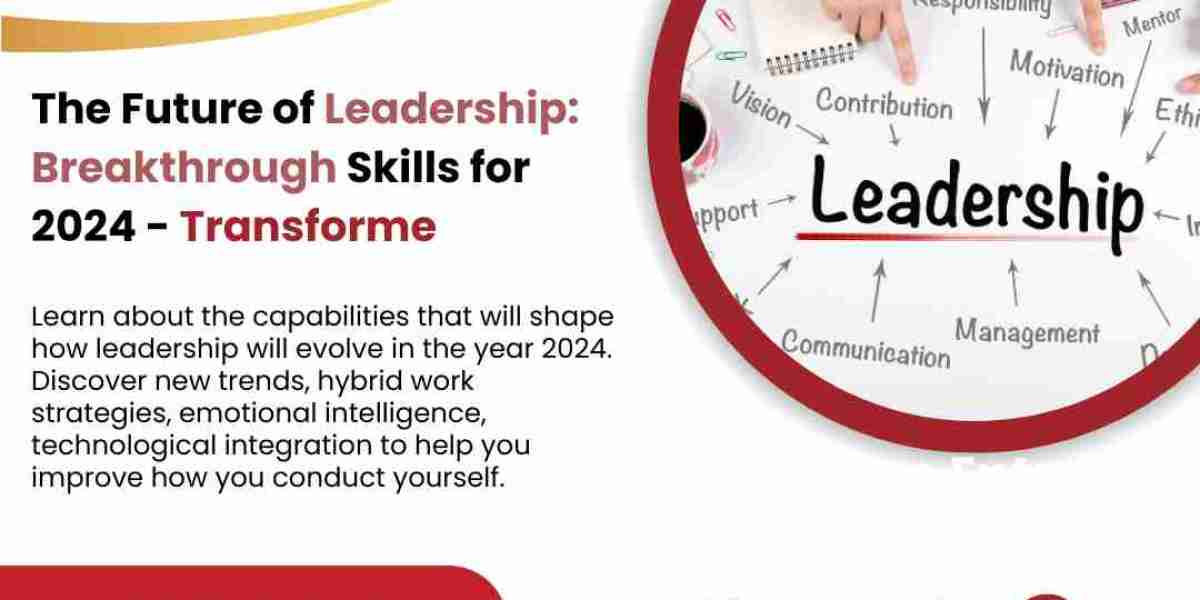The leadership profession is experiencing a massive change. As organizations navigate a fast changing workplace, driven by technological advancements and shifting expectations of employees and global challenges, leaders need to develop new abilities to stay ahead. The future of leadership will be more than managing teams. It's about adapting to new challenges as well as encouraging innovation and accepting diversity. Below, we look at the key trends and abilities that define how leadership will evolve in the coming years.
1. Emerging Leadership Trends Shaping 2024
Leadership's future is connected to wider societal and workplace developments. Three major trends are influencing the way leaders will take on the role of leaders in 2024.
Hybrid Work management: The hybrid workplace is now the standard. Leaders need to balance managing office and remote workers while fostering collaboration among teams that are dispersed. Effective communication and building trust is essential in this situation.
Technology Integration Since AI and automation change the way we work, our leaders have to leverage these tools to improve efficiency, while also addressing ethical issues and educating teams on how to adapt to the technologically driven workflows.
Diverse-Focused Leadership Leadership that is inclusive has gone beyond a mere buzzword. Innovative leaders are able to take advantage of different perspectives, and create inclusive environments that foster innovation.
By taking note of these trends, leaders can position their organizations for long-term success.
2. Essential Breakthrough Leadership Skills for the Future
In 2024, leadership requires a specialized skill set that is in line with the demands of today. These skills are revolutionary and include:
Emotional Intelligence Leaders who have an innate emotional intelligence (EI) can manage interpersonal dynamics with ease, while fostering confidence and participation. EI is crucial in motivating teams and solving conflict.
Flexibility: Change is the only constant in the business environment. Leaders who are able to adapt embrace uncertainties and quickly adjust their strategies to face new problems.
Data-driven decision-making Data analytics help leaders make better informed decisions. By studying the performance metrics and trends in the market and strategies, leaders can align their efforts with tangible results.
Organizations that offer breakthrough leadership training programs are emphasizing these competencies to help develop leaders that are prepared for the future's challenges.
3. How Hybrid Work is Transforming Leadership Approaches
Hybrid work is changing traditional leadership models. Although it provides the flexibility and effectiveness however, it also presents new challenges:
Communication Barriers ensuring clarity and consistency across physical and digital spaces requires a mastery of the communication tools.
Employee Engagement Remote employees might be disengaged, which requires deliberate efforts to create the feeling of belonging.
performance tracking: Traditional metrics may not be appropriate, and require innovative methods to assess and motivate teams that are hybrid.
Leaders need to embrace new approaches such as virtual town halls, one-on-1 check-ins, and collaborative tools to connect the office and remote team members. These strategies form the basis of successful training for leaders that are being offered in leadership training program in Mumbai as well as other towns that are adapting to this new trend.
4. The Role of Emotional Intelligence in 2024 Leadership Models
In a society where interpersonal connections are the key to the success of a company, emotional intelligence (EI) is recognized as an essential leadership skill. People with a high EI excel in the following areas:
Self-Awareness Recognizing their strength as well as their weaknesses and emotional triggers.
Empathy: Viewing situations from other perspectives and responding with empathy.
Conflict resolution: Resolving conflicts constructively in order to promote team harmony.
A concentration on EI helps leaders build stronger relationships, improve employee morale and boost the success of an organization. Initiatives that are focused on women, such as the women leadership program in bangalore focus on EI development, acknowledging the importance of EI in workplaces with diverse cultures.
5. Leveraging Technology for Effective Leadership in 2024
Technology is a dual-edged weapon for leaders. It streamlines their processes, but requires an enlightened integration. The most important technologies that are changing the way leaders lead include:
AI-Powered Insights AI tools analyse data to reveal actionable insights that allow leaders to take more strategic decisions quicker.
collaboration platforms: Applications like Slack, Microsoft Teams, and Zoom improve communication between teams that are geographically dispersed.
performance analytics: These platforms based on data track employee's performance and give feedback in real time.
In embracing technology with a sense of responsibility leaders can increase efficiency and encourage the development of.
6. Continuous Learning: The Key to Leadership Evolution
In an ever-changing world learning has become necessary, but it is. Continuous learning allows leaders to remain relevant and efficient.
adapting to industry changes: Staying updated with the latest trends in the industry helps leaders manage disruptions with ease.
Growing your personal growth Learning through life helps leaders to develop their resilience, creative as well as critical thought.
Enhancing Teamwork: The leaders who believe in learning encourage their teams to seek out improvement, and foster an environment of creativity.
Companies that focus on learning in leadership frameworks allow people to succeed in highly competitive environments.
7. Future-Proofing Leadership: Strategies for Success in a Dynamic World
To stay relevant, leaders should adopt innovative strategies that are forward-looking:
Encourage innovation: Encourage creativity by creating a safe environment to experiment.
Prioritize well-being: Balance productivity with mental health to ensure long-term success.
Develop a growth mindset: Embrace challenges as potential opportunities to develop.
The role of leadership isn't just about power, it's about helping others, adapting to changing conditions, and taking on constant improvement. Through a future-proofing approach they can manage the complexities and help ensure the success of their organization in the coming years.








